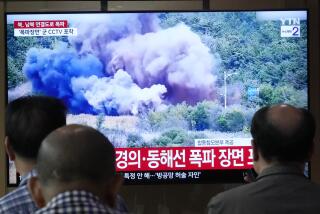An unexpected consequence of the thaw between the two Koreas: a budding real estate boom along the DMZ
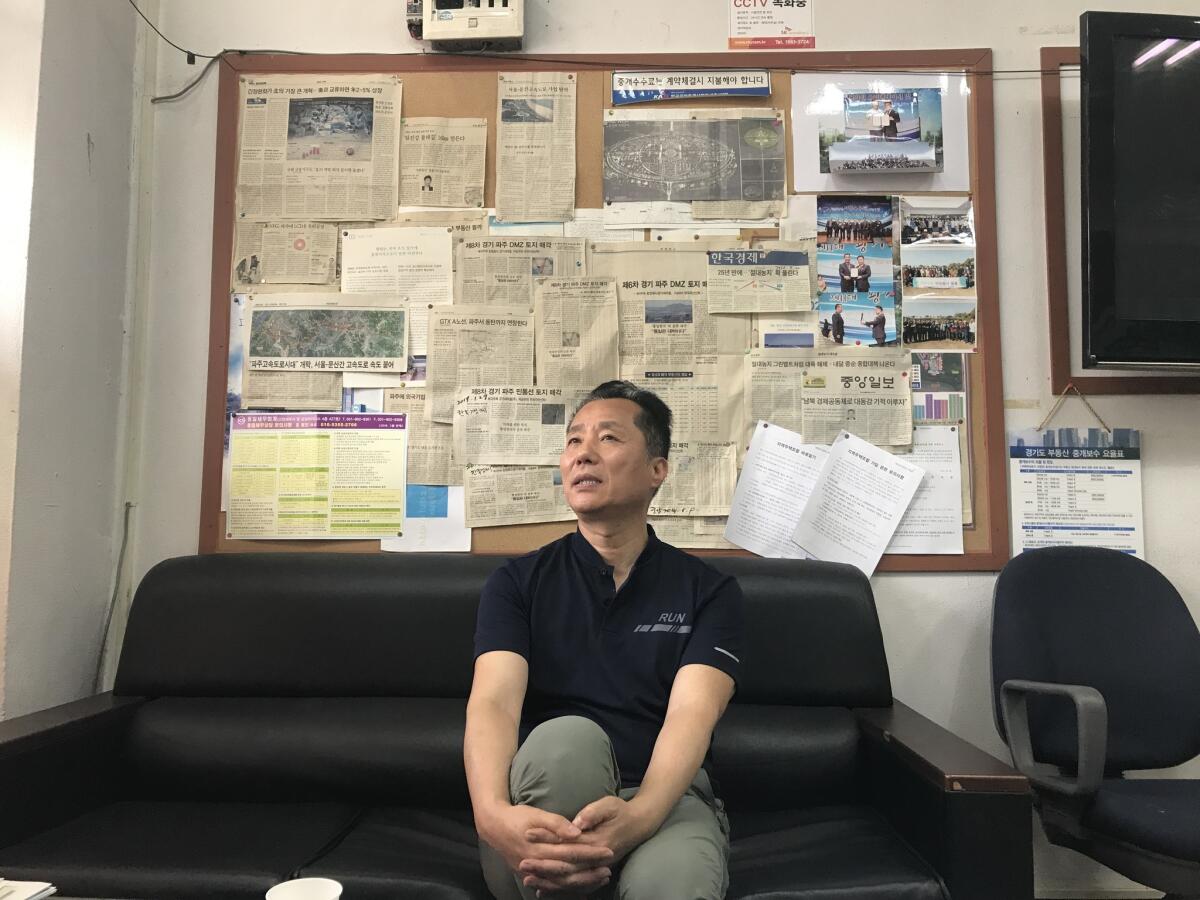
- Share via
Reporting from Tongil-chon, South Korea — In 1993, a land speculator arrived in this remote South Korean village of rice, bean and ginseng farmers, and liked what he saw.
Never mind the heavily fortified border with North Korea just a few miles away, the occasional landmine explosions or the North Korean propaganda blaring from loudspeakers at odd hours. Kim Yoon-sik, a developer then in his mid-30s, thought: “This looks like money.”
He bought up farmland and within a few years, set up shop as a real estate agent specializing in land near the border.
Kim has been waiting for his big break ever since, watching prices buoy with every thaw of relations between North and South Korea, and plummet with every provocation.
With military talks last week between the two Koreas reportedly involving discussions of the North moving long-range artillery away from the border, and South Korea and the U.S. suspending joint military drills planned for August following President Trump’s meeting with North Korean leader Kim Jong Un, this time just might be different.
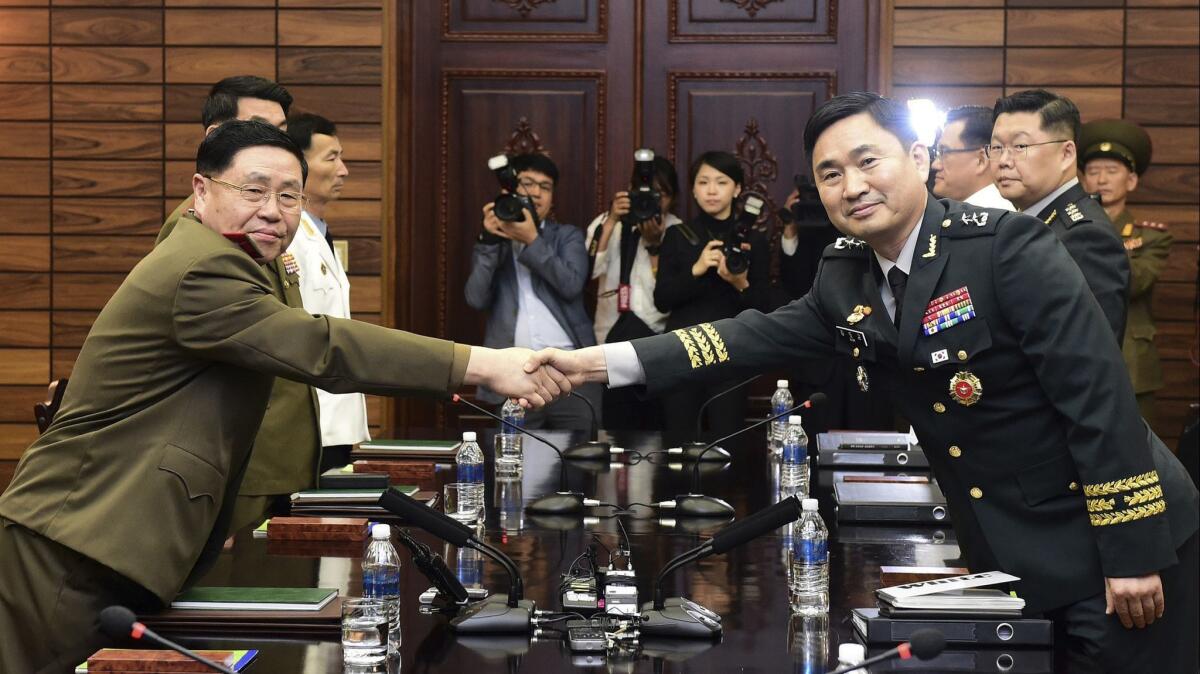
Prices for parcels in the border region are at or near all-time highs, real estate agents say, and buyers have been clamoring recently for a piece of borderland that is slated to become a prime corridor if trade and travel begin to cross this final Cold War frontier.
“If exchanges start taking place and the railway goes through, there’s no place hotter than here,” Kim said. “It all of a sudden goes from tragedy to hope.”
It’s a big if.
The Demilitarized Zone is a 2½-mile-wide strip of undeveloped land separating North and South Korea, technically still at war since 1950. Abutting the DMZ is an additional buffer area known as the Civilian Control Zone, mostly farm and forest land which can only be accessed by residents with entry permits, authorized personnel and visitors with escorts, and even then only through a South Korean military checkpoint.
Across the border is the North Korean city of Kaesong, where during a previous improvement of relations, an industrial complex enabled South Korean and foreign companies to utilize North Korean labor. The two Koreas in April agreed to work toward getting trains up and running across the border, potentially connecting South Korea by rail to China or Russia, and from there all the way to Europe.
The barbed wire fences and phalanx of soldiers haven’t kept the speculators away. In March and April, real estate transactions in the city of Paju, which includes borderlands, jumped to about three times the average level from the last decade, according to the most recent figures released last week by KB Financial Group. The city also recorded a near twofold increase in prices in April, while prices elsewhere in South Korea stagnated.
While separate figures aren’t available for border-adjacent lands specifically, Kim estimated there had been a five- to tenfold increase in transactions involving those areas since March.
On Monday, a middle-aged woman with a bouffant stepped out of a shiny black luxury sedan and into a real estate agency inside the civilian control zone. The woman, who said she’d driven up from Seoul, said she was just “looking around.”
Kim, the agent, said the latest rally began after Trump and Kim Jong Un abruptly agreed in early March to meet, setting the stage for an unprecedented meeting between a sitting U.S. president and a North Korean head of state.
Though there have been booms in past years when leaders of North and South Korea met, or the South Koreans announced initiatives involving the North, Kim Yoon-sik said he hadn’t seen anything like this before in his career.
His phone was ringing nonstop with hundreds of calls a day. Dozens arrived daily for in-person visits, driving, flying in from all corners of South Korea, some as far as Jeju Island, off the southern coast. There were interested buyers with deeper pockets than ever before — those willing to spend in the millions, not hundreds of thousands, of dollars.
“The investors came flooding in,” he said. “The calmly flowing river started coursing.”
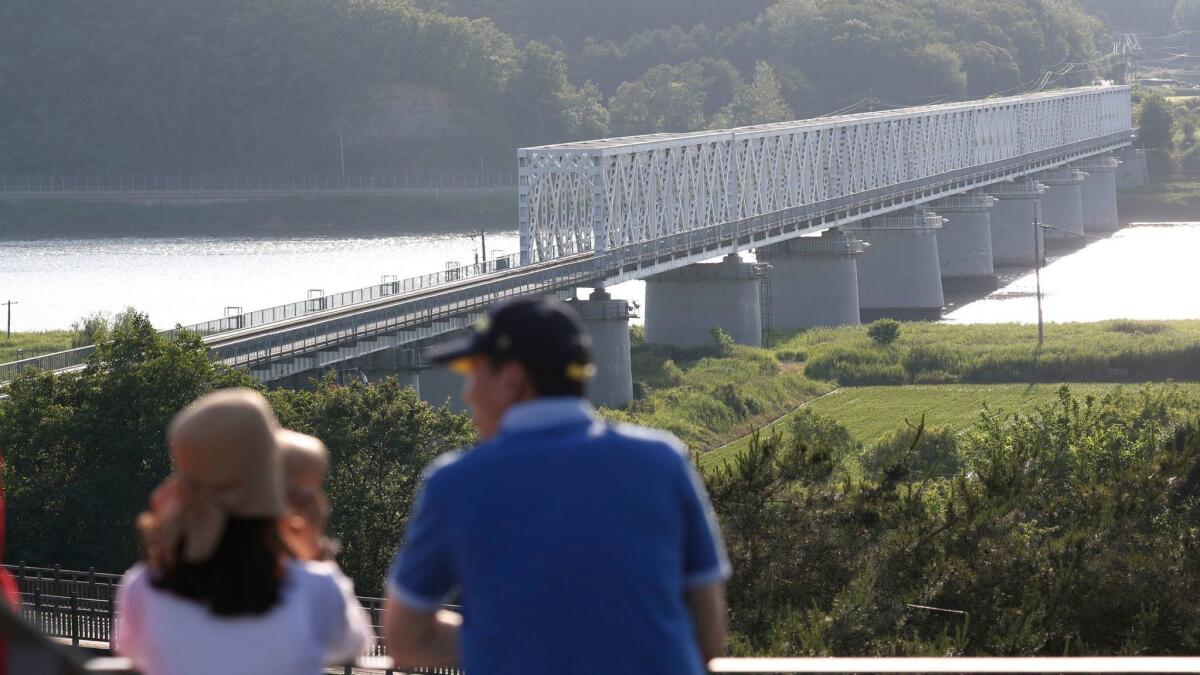
The real craze began, Kim said, after Trump called off the summit and the North’s Kim, rather than one-upping Trump and escalating the rhetoric as would have been typical of North Korea, appeared eager to make it work.
When the summit was back on, he said, “the typhoon turned into gale-force winds.”
“North Korea seems to be fundamentally changing, not just a temporary change,” said Lee Jong-sung, another real estate agent whose offices are inside the civilian control zone and who was bombarded with calls.
Buyers were even cutting big checks for land inside the demilitarized zone, which is off-limits to civilians, eager to sign deals after viewing land through satellite images. Civilians can own the land, even if they can’t go there, and at least half is estimated to be privately owned. Kim said it was “like land that’s still in a mother’s womb, not yet born to the world. If it is born, it’ll be huge.”
Park Young-ho watched as the potential buyers descended in recent weeks on his quiet village, in the DMZ-adjacent civilian control zone, many of them arriving in fancy cars and eating at his bean restaurant, which he runs as a side venture to his farming collective.
Park has lived in Tongil-chon — “Unification Village” — since it was first formed by the South Korean government in 1973, when he was in middle school, as a showcase town for North Korean viewing. The name refers to the long-held dream of a reunified Korea.
Sure, he had to travel an hour and half each way to school through the military post, and limbs and lives are lost to landmines with some regularity — most recently last year — but it’s a place where the air is clean and everyone leaves their front doors unlocked. It is, he said, the most peaceful place in Korea.
Besides, Park and his neighbors figure, any artillery fire will fly over their heads and be trained toward Seoul.
The real estate speculation and increased changing of hands means little for the 400-some residents of the village who farm the land, he said. Almost none of the outsiders who own about three quarters of the land in the military control zone actually move in, and most young people who grew up in town have left for jobs in the outside world. At 59, he’s one of the younger ones left.
He isn’t happy about his town increasingly being owned by outsiders and speculators, but perhaps it’s a sign his hometown is on the cusp of a major change.
“It’ll be a new day when unification happens,” he said. “We’re right in the center of it.”
For now, though, in the week following Trump’s summit with the North Korean dictator, the real estate fervor had cooled. Agents said investors appeared disappointed by the lack of concrete commitments in the resulting agreement.
“The thing that was so anticipated, when the lid was off, there wasn’t much to it,” said Kim, the real estate agent.
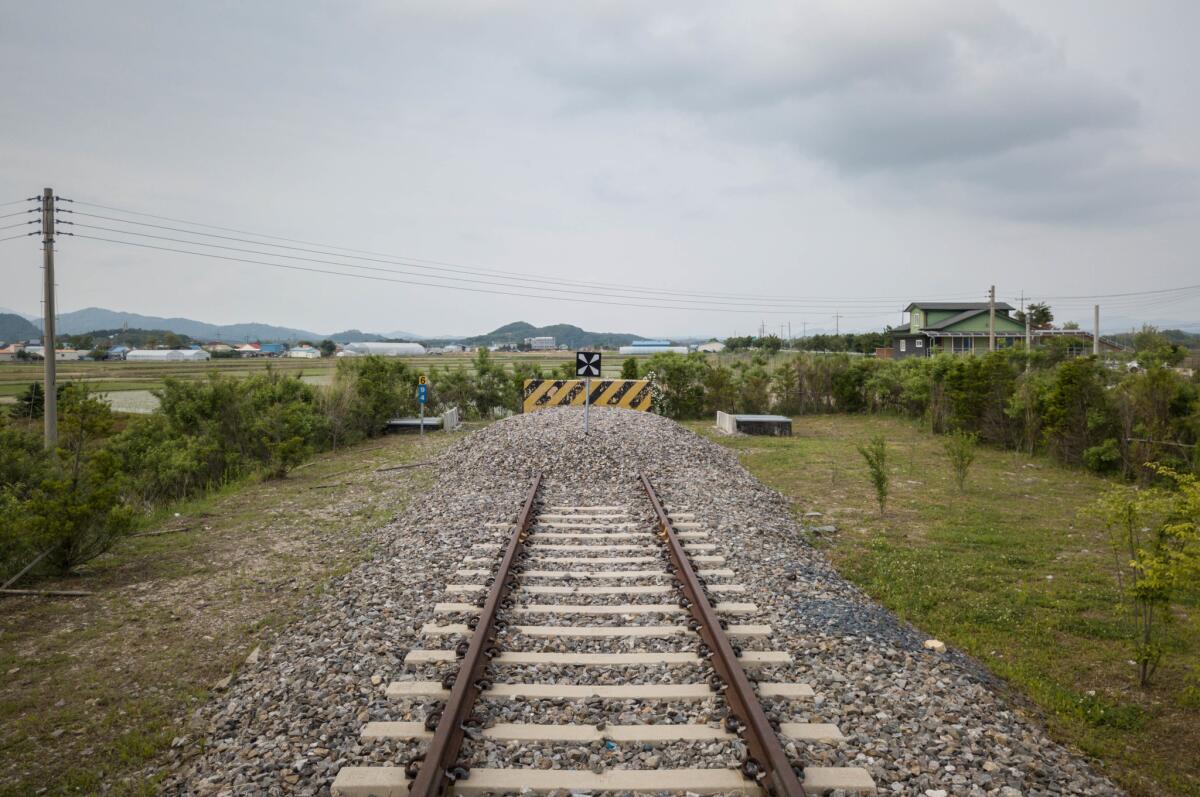
Ro Chong-lae, who runs a real estate agency inside the civilian control zone across the street from Park’s restaurant, said the stream of customers visiting to tour the land, as many as 10 a day at its height, had slowed to a trickle of maybe one a day.
“It was no specifics, all vague and ambiguous talk like drifting clouds,” said Ro, who has been dealing with borderlands for nearly three decades.
With sellers asking to take their listings down, waiting to see if prices will increase even further, there are slim pickings left on the market. At Kim’s agency on Monday, a couple in town from Ilsan, a suburb of Seoul, came complaining about issues with a seller who appeared to be getting cold feet while the land was in escrow.
As for Kim, both as a speculator and as an agent, he’s in no hurry. He’s in it for the long haul.
“I’m an investor like everybody else,” he said. “I just wised up to it 25 years earlier.”
[email protected] | Twitter: @vicjkim
More to Read
Sign up for Essential California
The most important California stories and recommendations in your inbox every morning.
You may occasionally receive promotional content from the Los Angeles Times.


